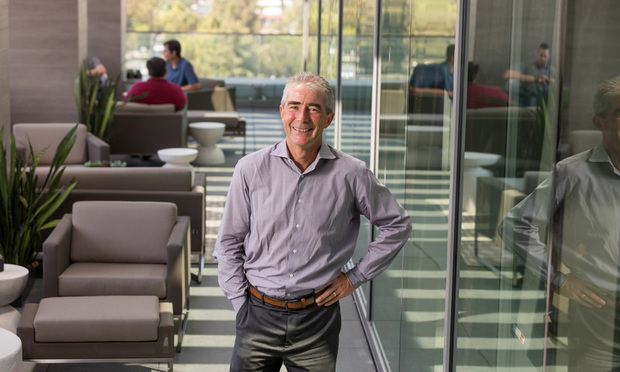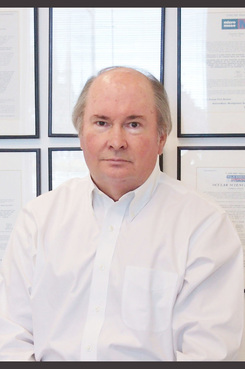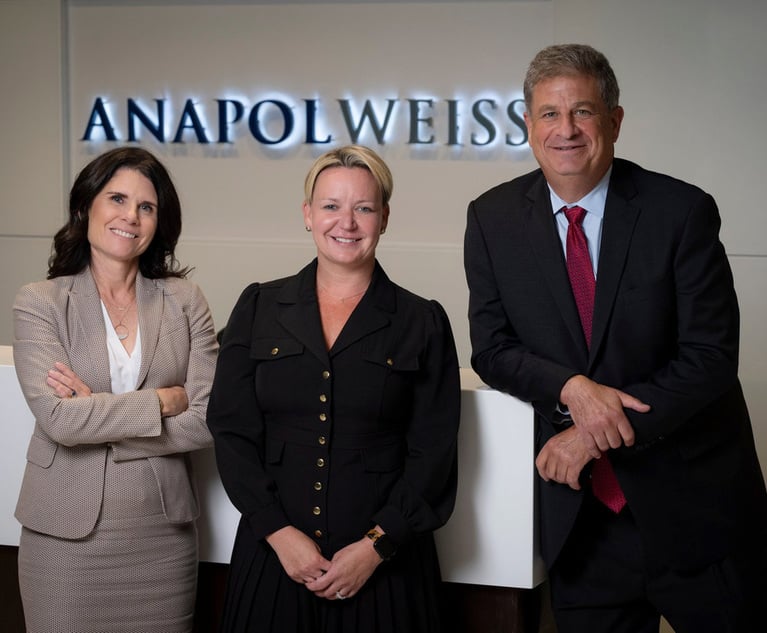How Gunderson Dettmer Stays Steady Through Silicon Valley's Boom-Bust Cycles
Formed 23 years ago this month by a group of lawyers fleeing a now-defunct legal giant, Gunderson Dettmer Stough Villeneuve Franklin & Hachigian may have a full shingle, but a focused strategy has helped it survive.
September 12, 2018 at 03:52 PM
11 minute read
 Scott Dettmer of Gunderson Dettmer Stough Villeneuve Franklin & Hachigian. Photo Credit: Jason Doiy/ALM
Scott Dettmer of Gunderson Dettmer Stough Villeneuve Franklin & Hachigian. Photo Credit: Jason Doiy/ALM
Gunderson Dettmer Stough Villeneuve Franklin & Hachigian celebrated its 23rd anniversary on Sept. 5 with a move into a new Silicon Valley headquarters. The outfit formed by six partners fleeing Brobeck, Phleger & Harrison has managed to survive and quietly expand long after its turn-of-the-century moment in the legal business spotlight.
The technology-focused firm made national headlines in 1999 for its decision to raise first-year associate salaries to $125,000 during the height of the dot-com boom. Despite that attention-grabbing move, Gunderson Dettmer has long remained tight-lipped about its financial performance through the boom-and-bust cycles of Silicon Valley.
Conversations with the firm's management, lawyers from other firms and legal industry observers, however, paint a picture of a firm that has solidified its niche in Silicon Valley's tech-based ecosystem. Gunderson Dettmer, which now has about 240 lawyers, including an all-equity partnership of 77, has focused on serving the legal needs of venture-backed technology and life sciences companies, as well as venture capital investors in those sectors.
The firm declined to discuss specific financial numbers, but confirmed that its profits per equity partner are at or above the numbers of its primary Bay Area-based competitors. And at a time when practically every firm in the country is on the hunt for lateral talent in San Francisco and Silicon Valley, Gunderson Dettmer hasn't had a single lateral partner depart in two-plus years.
Sizing Up the Competition
Fenwick & West, a 321-lawyer shop with profits per equity partner of $1.51 million last year, is the Am Law 100 firm most often cited by legal recruiters as having comparable financial returns. One California-based legal recruiter, who requested anonymity when discussing Gunderson Dettmer, said that during good years the firm's average equity partner profits can top $2 million. “Good Silicon Valley work is profitable,” the recruiter said in describing how the firm's relatively high rates help it keep up with the competition.
Larry Watanabe, a veteran legal recruiter in California with Solana Beach-based Watanabe Nason & Schwartz, said that it is difficult to compare Gunderson Dettmer to more full-service players in Silicon Valley, such as Fenwick & West, Orrick, Herrington & Sutcliffe and Wilson Sonsini Goodrich & Rosati.
“What really matters at the end of the day is partner retention,” Watanabe said. “If the partners don't feel they are being compensated competitively within the market, they are going to leave.”
Gunderson Dettmer, however, has not lost a lateral partner in more than two years. Watanabe said the dearth of defections is often an indicator of a stable partnership doing well financially.
 Jeffrey Vetter.
Jeffrey Vetter.One area where Gunderson Dettmer has been hurt in recent years, Watanabe said, is retaining startup companies as clients after they mature and go public. That led the firm to hire Jeffrey Vetter, co-chair of the corporate finance and securities group at Fenwick & West, to head its public offerings and companies practice.
“While they excel in early to midstage company representation, they are not as prominent in the IPO market,” said Watanabe about Gunderson Dettmer. “Wilson Sonsini originally developed the 'cradle to grave' concept with technology companies and ultimately taking them public. While Jeff [Vetter] represented many of Fenwick's clients in IPOs, his expertise can be transitioned to allow Gunderson to make a very credible pitch in this area.”
Asked about Vetter's addition, Gunderson Dettmer lauded his ability to work with “late-stage private technology companies in their IPOs and their lives as public companies.“ The firm said that Vetter will help “catapult“ it into the top tier of that market.
Resisting the 'Department Store' Model
Scott Dettmer, a founding partner of the firm and former head of its corporate and securities practice, said that when he and his fellow former Brobeck Phleger colleagues started Gunderson Dettmer in September 1995, they wanted to draw on the business model of Silicon Valley.
“It was a more novel theory back then,“ Dettmer recalled. “The companies we were involved with [at the time] really tried to focus on those areas where they were the very best, and not fake it or dabble in other areas.”
Dettmer is complementary of the competition at Orrick and Wilson Sonsini, both of which offer clients a broad range of practice areas. Gunderson Dettmer, however, does not. Still, Dettmer said his firm covers about 90 percent of its clients' legal needs. While Gunderson Dettmer doesn't do litigation or regulatory work, the firm's practice areas now include corporate and securities, fund formation, employment, executive compensation, IP, technology and tax.
“There is probably 10 percent that ends up being in some other areas—regulatory is a great example of that,“ he said. “What we have works for us and our clients.“
“We got a lot of criticism from competitors because we weren't full-service,” added fellow founding partner Robert Gunderson Jr. about his firm's approach upon its formation. “I think our view was full-service is department stores, and you can look and see today how well the department store has been doing.”
Just like the department store, once a thriving business, Gunderson believes it is increasingly difficult for Big Law to maintain a large portfolio of practices, be it banking, real estate or others.
“I think it becomes extraordinarily difficult to manage. If you look at these really successful New York firms, they are not full-service,” said Gunderson, adding that his firm's nimble and targeted approach helped it survive the collapse of the dot-com bubble and the 2008 recession.
Brobeck Phleger, the firm that spawned Gunderson Dettmer, dissolved in 2003. Each year dozens of other firms also close their doors. That's a fact not lost on Dettmer, a veteran of several boom-and-bust legal business cycles.
“Some that grew quickly during the tech heyday, the tech boom, had a harder time in the crash because they grew so quickly,“ Dettmer said. “The only glue within the organization was economic. So in a downturn, if your only glue [is money] and your firm declines, you've kind of lost the thing that holds you together.“
Gunderson Dettmer, which shrank to as few as 90 lawyers in 2002 following the dot-com crash, has been less affected by swings in Silicon Valley's economy because it has been cautious “not to get too far ahead of ourselves from a growth standpoint,” Dettmer explained.
 Robert Gunderson Jr.
Robert Gunderson Jr.“It was also driven by the fact that we were a relatively new firm,“ he added. “Everyone was high productive … so we didn't have to struggle with any difficult organizational challenges that other firms had.”
During the last two decades, Gunderson said he and his colleagues have been approached by other firms on “a number of occasions“ with regard to a potential merger. Each time, those suitors have been rebuffed, and Gunderson said his firm currently has no plans to pursue any kind of combination.
Targeted Approach, 'Concentric Bull's-Eye Circles'
Gunderson Dettmer did spark a significant change in the U.S. legal services sector with its dot-com era decision to become the first firm to raise first-year associate salaries to $125,000—higher than the $100,000 standard in Big Law at the time. Gunderson Dettmer is now among those busy matching new associate salary scales, including the $190,000 benchmark set this summer for junior lawyers by Cravath, Swaine & Moore.
Gunderson Dettmer said it now represents more than 2,500 high-growth technology and life science companies and serves as general counsel to more than 250 venture capital firms.
“Sometimes we think our strategy is [like] an archery target, with a bull's-eye and these kinds of concentric circles,” Gunderson said.
As Gunderson explained, his firm's strategy is to be the top firm in a specialized area. He cited Gunderson Dettmer's funds practice as being dominant in its space. Of the firm's nine offices, seven are in the United States, with the other two in Singapore and Beijing.
“Our focus has been, 'Where do we need to be?'“ Gunderson said. “'Where are the entrepreneurs? Where are the venture capitalists?' The logical first step was in China—the entrepreneurial community there is incredibly strong and developing. We are in Singapore primarily because of the market in India.”
Gunderson Dettmer said it closed $12 billion in venture capital financings and more than $30 billion in investor-side financings last year. Most recently, the firm represented Indian e-commerce giant Flipkart Internet Private Ltd. on its $16 billion sale to Walmart Inc. Several lawyers from the firm working on that deal are based in Singapore, where Gunderson Dettmer opened an office in 2017.
“Philosophically, our belief is that we want to be very good at what we are good at, and not try to be good at what we are not good at,” said M&A practice leader Andrew Luh, who took the lead on the Flipkart deal for Gunderson Dettmer. “We don't want to be all things to all people.”
The Gunderson Network
Luh joined Gunderson Dettmer's in Silicon Valley two years ago to help the firm build out its transactional practice. The firm has four full-time lawyers dedicated to M&A work, said Luh, who came aboard from Fenwick & West, where he spent nearly 20 years, 11 of them as a partner.
“From a long-term platform perspective, what a lot of folks, including myself, didn't understand was the breadth of the firm's practice,” Luh said. “[Gunderson Dettmer] has 2,000 startup clients.”
That generates a broad base of deal opportunities. Gunderson Dettmer recently advised ARMO BioSciences Inc. on the Redwood City-based biotechnology company's $1.6 billion sale to pharmaceutical giant Eli Lilly and Co. The firm, which once based its 1999 decision to raise associate salaries on a need to retain associates receiving lucrative offers from technology companies, now is supportive when clients seek to recruit from its ranks.
Dettmer said that Gunderson Dettmer's lawyers, especially its all-equity partnership, remain cohesive. According to the data collected by ALM Intelligence and confirmed by Gunderson Dettmer, in an era of increased lateral activity, no partners have left the firm during the last two years. (A decade ago this month, Gunderson Dettmer nearly watched a 30-lawyer team in New York decamp for Cooley, but that would-be mass lateral move stalled.)
Among the last three partners that have departed, two have joined cloud-based firms, with Rimon reeling in Chris Terry in 2015 and the VLP Law Group grabbing David Lee in 2014. David Van Horne Jr., who left Gunderson Dettmer for Goodwin Procter in 2013, is now a leader of that firm's business law department in San Francisco. Gunderson Dettmer did take a hit this summer when Steven Liu, the former head of the firm's China practice, died at 46. Leadership of the group has been transitioned to partners Zhen Liu and David Wang, whom Liu mentored closely during the past five years.
Gunderson Dettmer said it has hired more than 80 associates in the past two years, with about 40 associates leaving the firm during that same period. While some have joined other firms, many of them move to Gunderson Dettmer clients, such as venture capital funds or technology companies, which in the end helps the firm.
“They end up being an important part of our alumni [network],” Dettmer said. ”We end up working with them over the longer term.”
Related Stories:
Gunderson Dettmer Celebrates Anniversary With New Silicon Valley Digs
How One Silicon Valley Firm Beat the Odds and Made Big Gains
Gunderson Dettmer Grabs Securities, Corporate Finance Leader From Fenwick
This content has been archived. It is available through our partners, LexisNexis® and Bloomberg Law.
To view this content, please continue to their sites.
Not a Lexis Subscriber?
Subscribe Now
Not a Bloomberg Law Subscriber?
Subscribe Now
NOT FOR REPRINT
© 2025 ALM Global, LLC, All Rights Reserved. Request academic re-use from www.copyright.com. All other uses, submit a request to [email protected]. For more information visit Asset & Logo Licensing.
You Might Like
View All
Once the LA Fires Are Extinguished, Expect the Litigation to Unfold for Years
5 minute read

Faegre Drinker Adds Three Former Federal Prosecutors From Greenberg Traurig
4 minute read
Anapol Weiss Acquires Boutique Led by Star Litigator Alexandra Walsh
5 minute readTrending Stories
- 1How ‘Bilateral Tapping’ Can Help with Stress and Anxiety
- 2How Law Firms Can Make Business Services a Performance Champion
- 3'Digital Mindset': Hogan Lovells' New Global Managing Partner for Digitalization
- 4Silk Road Founder Ross Ulbricht Has New York Sentence Pardoned by Trump
- 5Settlement Allows Spouses of U.S. Citizens to Reopen Removal Proceedings
Who Got The Work
J. Brugh Lower of Gibbons has entered an appearance for industrial equipment supplier Devco Corporation in a pending trademark infringement lawsuit. The suit, accusing the defendant of selling knock-off Graco products, was filed Dec. 18 in New Jersey District Court by Rivkin Radler on behalf of Graco Inc. and Graco Minnesota. The case, assigned to U.S. District Judge Zahid N. Quraishi, is 3:24-cv-11294, Graco Inc. et al v. Devco Corporation.
Who Got The Work
Rebecca Maller-Stein and Kent A. Yalowitz of Arnold & Porter Kaye Scholer have entered their appearances for Hanaco Venture Capital and its executives, Lior Prosor and David Frankel, in a pending securities lawsuit. The action, filed on Dec. 24 in New York Southern District Court by Zell, Aron & Co. on behalf of Goldeneye Advisors, accuses the defendants of negligently and fraudulently managing the plaintiff's $1 million investment. The case, assigned to U.S. District Judge Vernon S. Broderick, is 1:24-cv-09918, Goldeneye Advisors, LLC v. Hanaco Venture Capital, Ltd. et al.
Who Got The Work
Attorneys from A&O Shearman has stepped in as defense counsel for Toronto-Dominion Bank and other defendants in a pending securities class action. The suit, filed Dec. 11 in New York Southern District Court by Bleichmar Fonti & Auld, accuses the defendants of concealing the bank's 'pervasive' deficiencies in regards to its compliance with the Bank Secrecy Act and the quality of its anti-money laundering controls. The case, assigned to U.S. District Judge Arun Subramanian, is 1:24-cv-09445, Gonzalez v. The Toronto-Dominion Bank et al.
Who Got The Work
Crown Castle International, a Pennsylvania company providing shared communications infrastructure, has turned to Luke D. Wolf of Gordon Rees Scully Mansukhani to fend off a pending breach-of-contract lawsuit. The court action, filed Nov. 25 in Michigan Eastern District Court by Hooper Hathaway PC on behalf of The Town Residences LLC, accuses Crown Castle of failing to transfer approximately $30,000 in utility payments from T-Mobile in breach of a roof-top lease and assignment agreement. The case, assigned to U.S. District Judge Susan K. Declercq, is 2:24-cv-13131, The Town Residences LLC v. T-Mobile US, Inc. et al.
Who Got The Work
Wilfred P. Coronato and Daniel M. Schwartz of McCarter & English have stepped in as defense counsel to Electrolux Home Products Inc. in a pending product liability lawsuit. The court action, filed Nov. 26 in New York Eastern District Court by Poulos Lopiccolo PC and Nagel Rice LLP on behalf of David Stern, alleges that the defendant's refrigerators’ drawers and shelving repeatedly break and fall apart within months after purchase. The case, assigned to U.S. District Judge Joan M. Azrack, is 2:24-cv-08204, Stern v. Electrolux Home Products, Inc.
Featured Firms
Law Offices of Gary Martin Hays & Associates, P.C.
(470) 294-1674
Law Offices of Mark E. Salomone
(857) 444-6468
Smith & Hassler
(713) 739-1250






